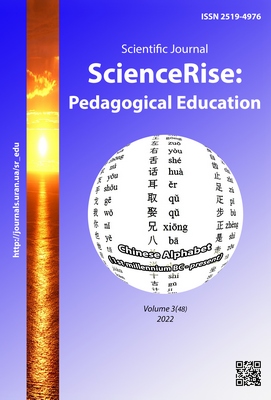Features of training of vocational education teachers in Germany
DOI:
https://doi.org/10.15587/2519-4984.2022.257349Keywords:
vocational education in Germany, teacher training, standards, competencies, teaching, education, assessment, innovation, curriculum, internshipAbstract
Influenced by the processes of European integration, globalization and, in particular, in order to build a single European higher education area, an important task of Ukrainian educators is to study the practical experience of our foreign colleagues in training teachers for vocational schools at all levels. Among the European countries where close attention is paid to the quality of teacher training, in particular in the field of vocational education, Germany stands out. The purpose of the study is to analyze the features of modern training of teachers of vocational education in Germany with the prospect of using progressive German experience in the Ukrainian system of training/retraining of teachers for institutions of professional and higher technical education. A detailed analysis of the German teacher training system, carried out in the course of this study, allowed us to make some important generalizations. First, it is worth noting the high expediency and effectiveness of Germany's extensive system of institutions, which, thanks to a clear division of functions, contribute to the effective organization of three-stage training of qualified teachers for vocational education. Secondly, the analysis of the content of the curriculum for future teachers of vocational education in Germany shows an attempt to train competitive professionals not only in the vocational education system, but also in the labor market in general. Third, the developed Standards for teachers in the field of educational sciences effectively influence the implementation of training programs for teachers of vocational education, requiring the formation and further improvement of their competencies in the field of teaching, education, evaluation and implementation of innovations. Finally, it is worth noting the urgent need to use the achievements of the German experience of practical training of VET teachers in the Ukrainian system of training and retraining of teachers for institutions of professional and higher technical education
References
- Abashkina, N. V. (1999). Rozvytok profesiinoi osvity v Nimechchyni (kinets XIX–XX st.). Kyiv: IPPPO APN, 46.
- Batechko, N. H. (2016). Teoretyko-metodolohichni zasady pidhotovky vykladachiv vyshchoi shkoly v umovakh mahistratury. Kyiv: NUBPU, 669.
- Kozak, T. B. (2016). Profesiina pidhotovka molodi u Nimechchyni. Ternopil: FOP Palianytsia, 254.
- Turchyn, A., Kashuba, O., Kravchuk, T. (2020). Praktychna profesiino-pedahohichna pidhotovka maibutnikh uchyteliv profesiinykh shkil u Nimechchyni: osoblyvosti dualnoi modeli. Naukovi zapysky Berdianskoho derzhavnoho pedahohichnoho universytetu. Berdiansk, 1, 460–475.
- Nakonechna, M. V. (2018). Profesiina osvita v Nimechchyni v konteksti istoryko-pedahohichnoho analizu. Molodyi vchenyi, 10 (62), 81–85.
- Barabasch, A., Watt-Malcolm, B. (2013). Teacher preparation for vocational education and training in Germany: a potential model for Canada? Compare: A Journal of Comparative and International Education, 43 (2), 155–183. doi: http://doi.org/10.1080/03057925.2012.661216
- Deissinger, T., Gonon, P. (2016). Stakeholders in the German and Swiss vocational educational and training system. Education + Training, 58 (6), 568–577. doi: http://doi.org/10.1108/et-02-2016-0034
- Deissinger, Th., Braun, V., Melnyk, O.; Deissinger, T., Braun. V. (Eds.) (2018). VET teacher education in Germany. Structural issues and fields of conflict in Business and Economics Education. Improving teacher education for applied learning in the field of VET. Münster: Waxmann, 29–72.
- Standards für die Lehrerbildung: Bildungswissenschaften (2004). Available at: http://surl.li/bxkbe
- Upravlinnia pidhotovkoiu vykladachiv profesiinoi osvity u krainakh YeS: zahalnyi ohliad (2020). Available at: http://surl.li/bxkap
- Rahmenvereinbarung über die Ausbildung und Prüfung für ein Lehramt der Sekundarstufe II (berufliche Fächer) oder für die beruflichen Schulen (Lehramtstyp 5) (2016). Available at: http://surl.li/bxkbo
Downloads
Published
How to Cite
Issue
Section
License
Copyright (c) 2022 Galyna Lysenko

This work is licensed under a Creative Commons Attribution 4.0 International License.
Our journal abides by the Creative Commons CC BY copyright rights and permissions for open access journals.
Authors, who are published in this journal, agree to the following conditions:
1. The authors reserve the right to authorship of the work and pass the first publication right of this work to the journal under the terms of a Creative Commons CC BY, which allows others to freely distribute the published research with the obligatory reference to the authors of the original work and the first publication of the work in this journal.
2. The authors have the right to conclude separate supplement agreements that relate to non-exclusive work distribution in the form in which it has been published by the journal (for example, to upload the work to the online storage of the journal or publish it as part of a monograph), provided that the reference to the first publication of the work in this journal is included.







